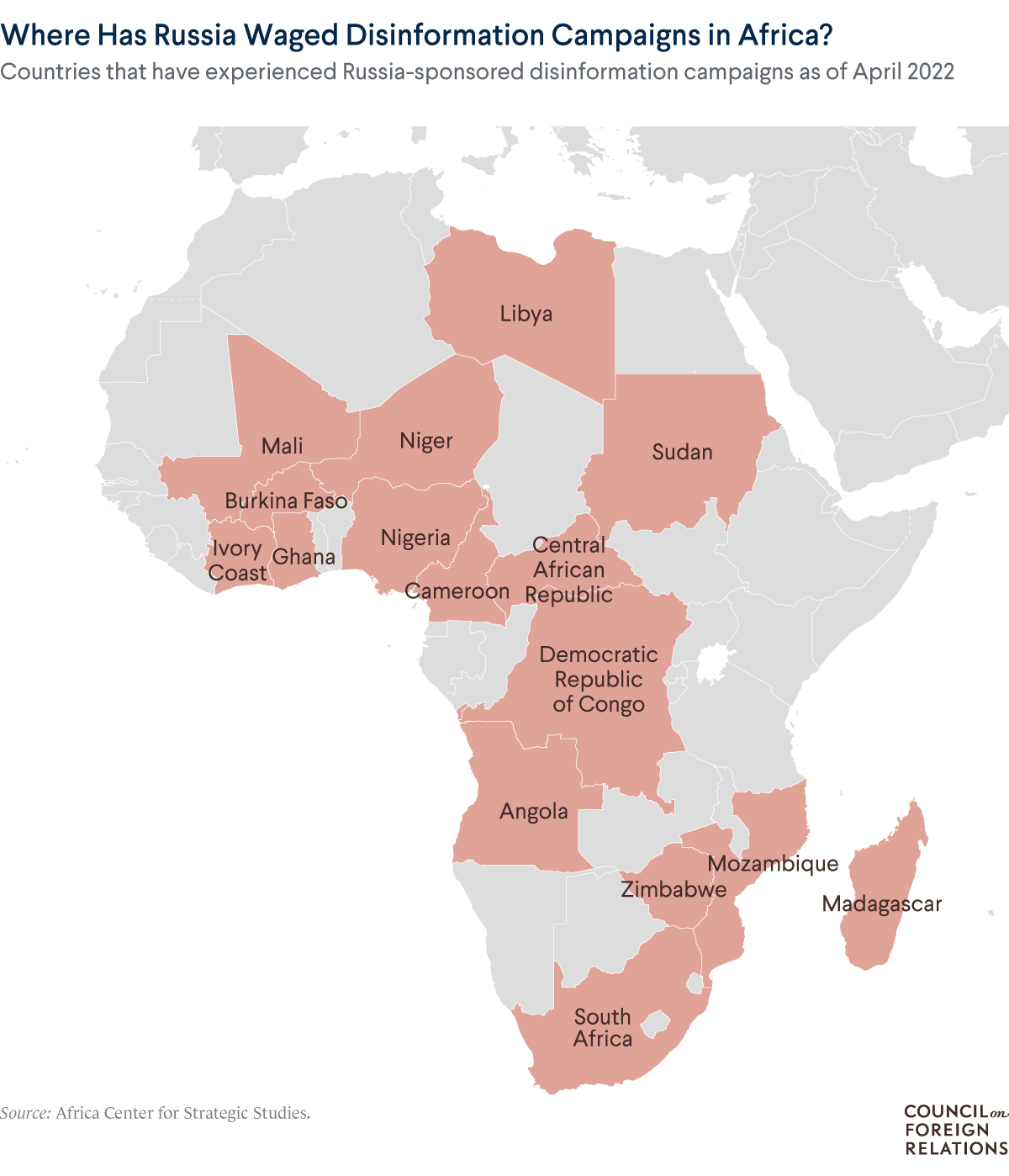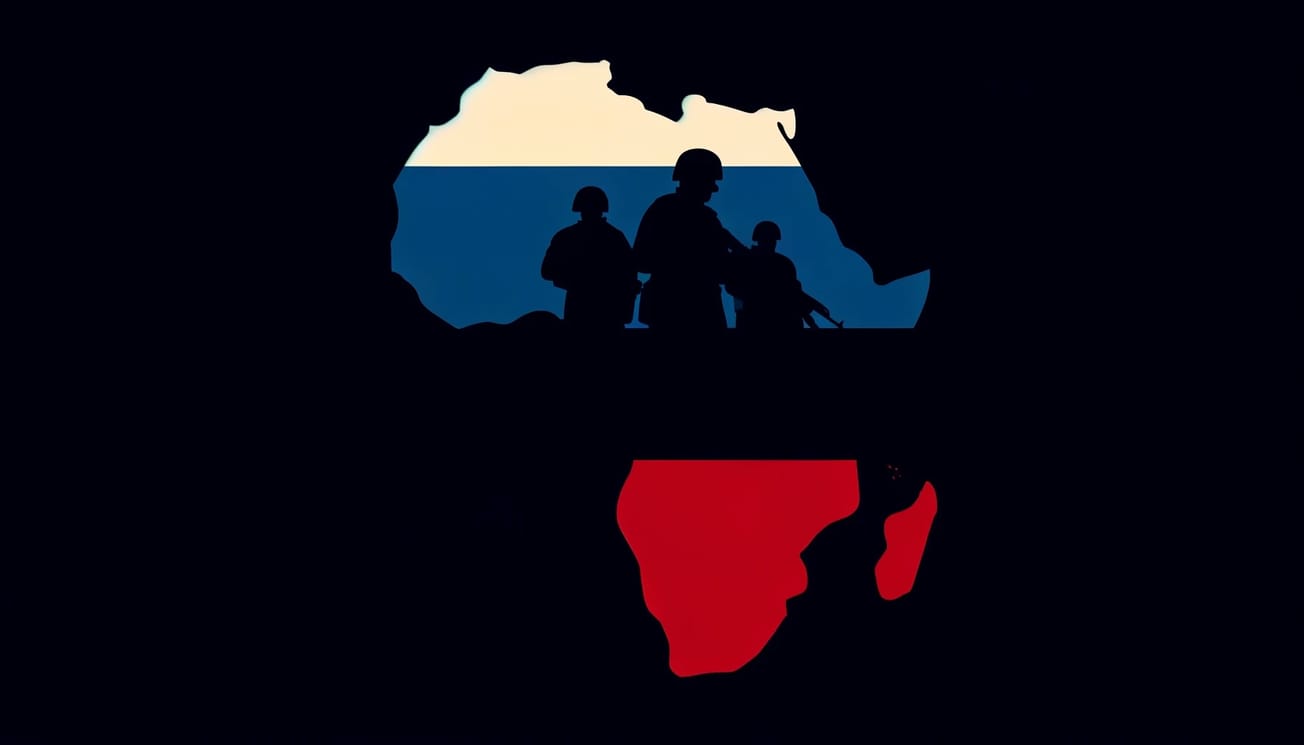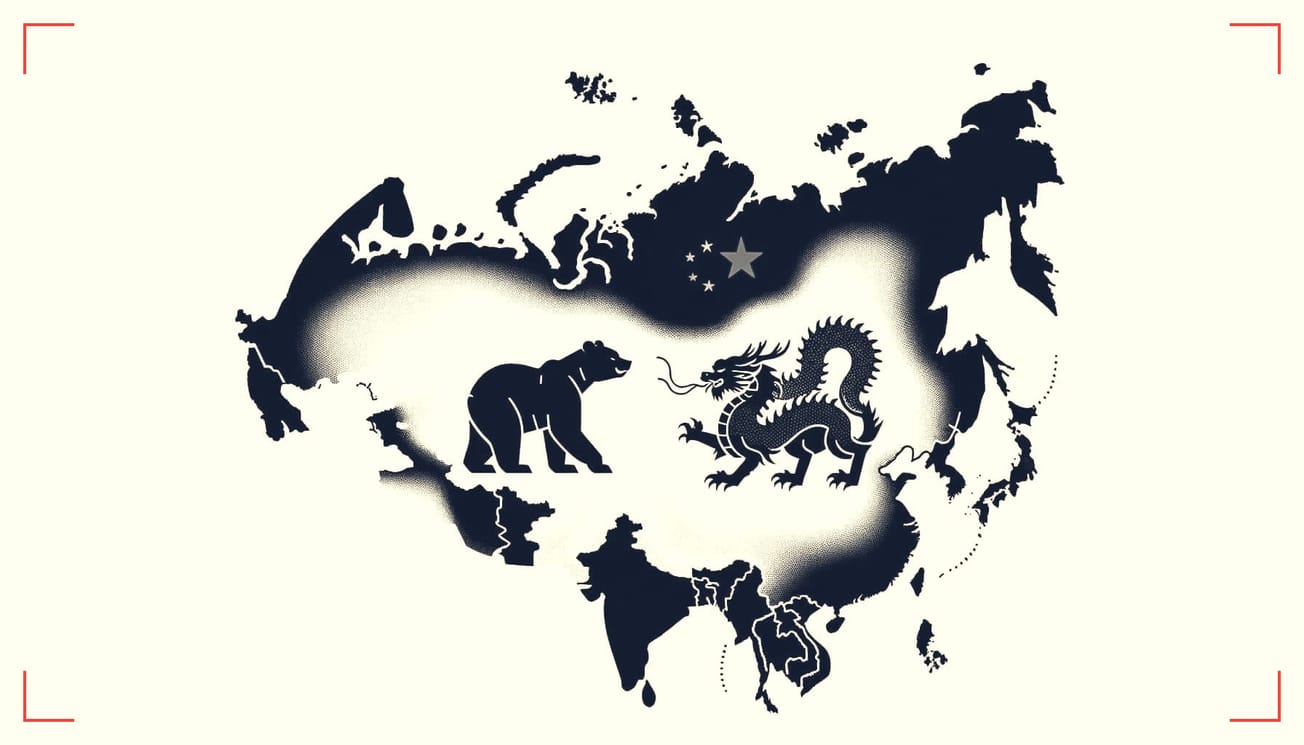
By Carl Aellen
+ Russian strategy in Africa is misconstrued as being an effort at competition, when in reality Russia seeks to make the information, business, and security environment on the continent hostile to Western entities.
+ Pioneered by Wagner, “regime survival packages” are essentially a wish list of Russian-backed services including military assistance, strategic advising, intelligence, surveillance, reconnaissance, and political support.
+ Russia's activities in Africa disrupt safety for Western firms, involving widespread disinformation, similar to tactics used in Europe and the USA. These efforts destabilize the region and influence public opinion to favor Russia.
+ To effectively mitigate vulnerabilities to disinformation campaigns, it is crucial to thoroughly understand the security dynamics of the country where investments are being made. Western businesses must enhance security, cultivate local partnerships, and adapt operations to mitigate these threats.
Russia’s successful interventions across Africa highlight the continent’s geopolitical significance.
As one of the world's most populous and fastest growing continents, Africa has been an often overlooked but vital stage for geopolitical competition defined by both internal turmoil, as well as exploitation, intervention and investment by external states. Since the start of the 21st century, Western influence in Africa has maintained a large and comprehensive presence on the continent. Major Western powers in Africa such as the United States, the UK, and France have all fostered political and economic interconnection with the continent; but this has also been accompanied by military interventions and presences such as in Mali, Niger, and the Central African Republic. Western investment in the continent has been significant, with private firms, development initiatives, and non-governmental organization (NGO) projects being found in almost every country in Africa.
Over the past 10 years, however, this influence has been disrupted. With an increasingly multipolar world as well as a more adversarial geopolitical climate, countries like China have upended the value of Western investment in Africa by providing strong financial and infrastructure opportunities for various governments on the continent. On the other hand, Russia in particular has also turned its eye toward flexing its strength in this region. However, with Russia not being an economic power able to compete with either Europe, the United States, or China, its goals are fundamentally different from one of a competitor. Russia seeks instead to use its limited resources to disrupt and evict Western actors from Africa and establish alliances of convenience that can prove to be a major challenge for Western influence.
What does Russian influence in Africa look like?
In the last decade, Russia has increased its involvement in Africa using several methods. The two major components of the Russian strategy in Africa involve the use of private military companies (PMCs), either directly or indirectly, in addition to information campaigns that seek to precipitate attitudes and action in populations throughout the continent.
The rise of Russia’s PMCs has been the most visible and reported element of Moscow’s influence on the continent. However, since 2014, Russia’s increasingly belligerent position toward the West, and willingness to engage in direct confrontation, has led the Kremlin to flex military muscle around the world. The Russian intervention in Syria is the largest example, however, Africa has been a major focus of such operations since the full-scale invasion of Ukraine. Until 2023, Russian military activity in Africa was mostly conducted via the Wagner Group, which most Western intelligence services consider an unofficial branch of Russia’s military intelligence agency (GRU), despite its official label as a PMC. Wagner activities quickly grew from 2017 onward, acting in tandem with Russian geopolitical interests and diplomatic goals; Wagner established operations in the Central African Republic (CAR) and Libya most notably, with those operations spreading to Mali, Mozambique, Madagascar, Burkina Faso, Sudan, Niger, the Democratic Republic of Congo (DRC), and Chad, among others, over the last several years.

From 2023, as a consequence of Wagner PMC’s attempted mutiny, Wagner assets and operations have been subsumed directly by the Russian Ministry of Defense (MOD), with some of its operations being carried out through the new “Africa Corps'', or other PMCs more closely controlled by the Russian state, such as Redut. Despite international criticism highlighting the unaccountable, non-transparent nature of Russian PMC operations in Africa, which likely include major violations of international law such as war crimes, the Russian military presence has continued to spread, and has often come at the expense of Western interests and diplomatic currency, such as the French expulsion from Mali and Chad.
A 2024 RUSI report referred to the suite of services provided by Russian PMCs as “regime survival packages”: a wish list including military assistance, operational and strategic advising, intelligence, surveillance, reconnaissance, and political support. Direct military assistance can consist of battalion-sized groups providing experienced and resourced personnel in countries where security structures are weak, and where authoritarian governments seek protection in exchange for resources such as diamonds, minerals, or metals such as gold. Since the Russian economy cannot provide much value in the way of trade to many of these countries, this model seeks to disrupt Western influence more than it seeks to gain major economic or diplomatic advantages. While regimes that employ Russian mercenary contingents are often assessed to pay in resources or hard currency that can allow Russia to circumvent sanctions, most of this revenue goes back into operation costs for the mission.
While the PMC aspect remains the most visible, a key element of Russian operations throughout the continent consists of information warfare, with major Russia-backed disinformation campaigns being spotted in almost every country on the continent. Russia’s disinformation in Africa seeks to create hostile environments for Western actors, while spreading sentiment favorable to Russian positions on key international issues such as the War in Ukraine. These campaigns often use social media to push pro-Kremlin, anti-West narratives, and seek to fracture African civil society from within, by exploiting and amplifying local grievances regarding Western policies or actual domestic governance problems.
Implications for Western Actors
Expanding Russian operations in Africa, both in the military and information space, have wide-ranging implications for Western policy goals, and will create near- and long-term challenges for Western actors to operate safely and effectively.
A direct consequence of Russian interventions in countries like Mali, the CAR, Sudan, and Burkina Faso has been the eviction of Western-led military presences from these countries. This often coincides with severe breaks in relations between the country in question and the Western states seeking to maintain friendly or even cordial relations. Another direct consequence of Russian PMC interventions has been socio-political shifts across entire regions, such as what has happened in the Sahel in the last 3 to 5 years, which shifted to reject any Western presence as hostile and unwelcome. Western companies and organizations are therefore more and more constricted in their ability to operate in such areas. The political risk associated with investment in these countries, or even regions, where Russian military operations are active, now prove too great. Badly needed Western investment has been falling in the past two years as a result, and the trend is likely to continue.
Russian disinformation has also been used to target specific individuals, such as individual diplomats, or the personnel of private companies, INGOs or development agencies.
Perhaps even more powerful than direct military interventions, however, is Russia’s use of disinformation campaigns. Aggressive, targeted disinformation is proving to be an even more important risk for Western diplomacy and businesses active on the continent. These campaigns employ a diverse array of tactics, and often seek to sow or encourage distrust of Western actors throughout society by using social media, bots, AI, local influencers, and other online disinformation methods. These attacks have been successfully aimed at out-sized targets, such as the credibility of the French military and government in the Sahel. At the same time, disinformation campaigns shift local perceptions toward a more positive view of Moscow in its war of aggression against Ukraine, and amplify anti-Western sentiments and arguments accusing Western governments and organizations of complicity in imperialist practices.
Finally, Russian disinformation has also been used to target specific individuals, such as individual diplomats, or the personnel of private companies, INGOs or development agencies. By inventing or spreading controversial rumors, such as allegations of sexual misconduct, corruption, or other incendiary accusations, Russian disinformation can deal severe blows to an organization's reputation, and even compromise the safety of individuals and operations. In countries and cultures where such rumors or allegations can result in heightened tensions or even violent confrontation and reprisals, such risks can often make the environment non-permissive. These disinformation campaigns are not necessarily designed to give Russian actors an economic or other advantage over the Western competition, but to make the environment untenable and hostile to non-Russian actors to such an extent that entire regions or countries are lost to major investment.
Preparation and Mitigation: Key Recommendations
In order for organizations to be better prepared to face the challenges posed by this effective style of Russian malign influence, a few measures should be taken into account to counteract it, and protect reputation and operations.
First, and most consequential, is an in-depth, country-specific and regional understanding of the socio-political context in which an organization is seeking to operate. This is paired with meaningful investment in, and support for, those individuals and groups countering disinformation. This is important when assessing whether or not an organization has the ability to operate safely within a given country, and helps that organization plug into ongoing efforts by those in civil society to create a more permissive environment.
Further, to effectively mitigate vulnerabilities to disinformation campaigns, it is crucial to thoroughly understand the security dynamics of the country where investments are being made. Part of this task is also to engage with local partners, government, and society in order to protect against malicious reputational damage designed specifically to break the trust between the organization and those in the country. A key element to tackling the risk of Russia’s disinformation strategy is training staff in basic security practices, especially in the cyber domain, where personnel can be particularly vulnerable to hacking, social engineering, and other attacks which can put operations, reputation, and personnel in real danger.
Organizations should therefore be on guard against the use of information warfare techniques, as well as maintain communication and understanding with the local population. This is especially relevant in countries where there is assessed to be a strong Russian interest in causing distress to Western organizations, companies, and INGOs, such as in the Sahel, Sudan, the DRC, and others.
Russian activity in Africa is not just an issue that affects high-level diplomacy and strategy, but one that permeates the environment where Western firms seek to operate safely. Russia’s strategy in Africa is not one of responsible competition, it is one designed to endanger non-Russian interests. As with disinformation campaigns in Europe or the United States, it is a strategy meant to sow confusion and ultimately shift public opinion toward supporting Russian political and economic objectives. Both direct military interventions and disinformation campaigns have these as objectives, even if one is more easily visible than the other. Western organizations should therefore be conscious of this threat, and seek to develop local relationships, train their staff in online as well as personal security, and adjust location or operations so as to minimize and manage these sources of risk.





